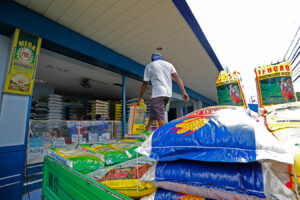THE Department of Agriculture (DA) said on Wednesday that the sale of government-subsidized rice to the general public will be launched at four KADIWA centers in Metro Manila starting Aug. 1.
Agriculture Assistant Secretary and Spokesperson Arnel V. de Mesa said that the so-called Rice for All program will launch at KADIWA outlets in Malabon, Caloocan, Food Terminal, Inc. in Taguig, and the Bureau of Plant Industry in Manila.
“The stocks will come from commercial sources and can be imported or domestically grown depending on which traders participate,” Mr. De Mesa said at a briefing.
Well-milled rice will sell for P45 per kilogram, with premium rice fetching P52 kilo. Purchases are limited to 25 kilos per person per day.
Commercial outlets sell imported well-milled rice prices in Metro Manila for between P51-P53 per kilo, while domestically grown well-milled rice fetched between P45 and P55 as of July 30, according to DA price monitors.
Imported premium rice in Metro Manila markets was selling for P53-60 per kilo, while the domestically grown equivalents were priced at P50-P58.
Prices at KADIWA outlets “will be adjusted depending on the movement of rice prices but will definitely be lower than retail prices in general,” Mr. De Mesa added.
He said that more outlets will be added later in August.
Mr. De Mesa said the government could also extend the P29 subsidized-rice program for 34 million vulnerable individuals, including persons with disabilities, solo parents, and senior citizens, as well as those below the poverty line.
“The objective of this Rice for All program is to make cheaper rice available. This is one of the initiatives of government to lower the impact of food items on inflation,” Mr. De Mesa said.
According to the Philippine Statistics Authority, inflation eased to 3.7% in June, with rice inflation accounted for 42.5% of overall inflation. Rice inflation eased to 22.5% from a month prior.
To lower rice prices the government reduced the import tariff on rice to 15% until 2028, via the issue of Executive Order (EO) No. 62.
Mr. De Mesa said that the DA is expecting prices to drop by August, judging from the higher import volumes approved by the Bureau of Plant Industry (BPI).
He said that the tariff cut itself is expected to lead to a P6 to P7 per kilo price reduction.
As of July 20, rice imports amounted to 2.39 million metric tons (MT), according to the BPI. For July, as of the 20th of the month, rice imports totaled 56,118 MT.
He said that traders are currently taking a “wait and see attitude” pending a Supreme Court’s decision on EO 62, the legality of which is being contested by farmers, who claim the order was issued without the consultation needed to implement tariff adjustments. — Adrian H. Halili
